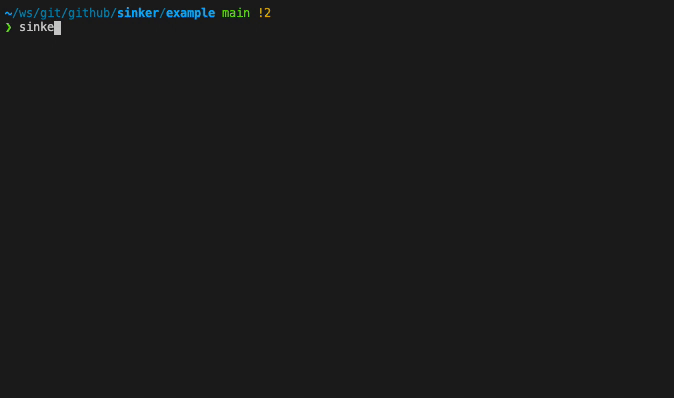sinker syncs container images from one registry to another. This is useful in cases when you rely on images that exist in a public container registry, but need to pull from a private registry.
Images can be sync'd either by using The image manifest or via the command line.
See the example folder for more details on the produced files.
GO111MODULE=on go get github.com/plexsystems/sinker
Releases are also provided in the releases tab on GitHub.
target:
host: mycompany.com
repository: myteamThe target section is where the images will be synced to. The above yaml would sync all images to the myteam repository hosted at mycompany.com (mycompany.com/myteam/...)
target:
host: mycompany.com
repository: myteam
sources:
- repository: coreos/prometheus-operator
host: quay.io
tag: v0.40.0
- repository: super/secret
tag: v0.3.0
auth:
username: DOCKER_USER_ENV
password: DOCKER_PASSWORD_ENV
- repository: nginx
digest: sha256:bbda10abb0b7dc57cfaab5d70ae55bd5aedfa3271686bace9818bba84cd22c29In both the target and sources section, the host field is optional. When no host is set, the host is assumed to be Docker Hub.
All auth is handled by looking at the clients Docker auth. If the client can perform a docker push or docker pull, sinker will be able to as well.
Optionally, the auth section allows you to set the names of environment variables that will be used for creating basic auth to the registry. This could be useful in pipelines where auth is stored in environment variables.
If the target registry supports nested paths, the entire source repository will be pushed to the target. For example, the prometheus-operator would be pushed to:
mycompany.com/myteam/coreos/prometheus-operator:v0.40.0
Registries that support nested paths: Azure Container Registry (ACR), Amazon Elastic Container Registry (ECR), Google Container Registry (GCR)
If the target registry does not support nested paths, only the base path of the source will be pushed to the target registry. For example, the prometheus-operator would be pushed to:
mycompany.com/myteam/prometheus-operator:v0.40.0
Registries that do not support nested paths: Docker Hub, Quay.io
Descriptions of commands and flags to help understand how to use Sinker.
Set the directory or location of the manifest file to read from. Defaults to .images.yaml in the working directory.
Push all of the images inside of the image manifest to the target registry.
$ sinker pushThe --dryrun flag will print out a summary of the images that do not exist at the target registry and the fully qualified names of the images that will be pushed.
A list of images can be specified with the --images flag. Set the target with --target (required).
$ sinker push -i busybox:latest,quay.io/coreos/prometheus-operator:v0.40.0 -t host.com/repoPulls the source or target images found in the image manifest.
Pulling the source could be useful if you want to perform additional actions on the image(s) before performing a push operation (e.g. scanning for vulnerabilities).
Pulling the target could be useful if you need to load the images into another environment, such as Kind.
$ sinker pull <source|target>A list of images to pull, delimeted by commas.
Prints a list of either the source or target images that exist in the image manifest. This can be useful for piping into additional tooling that acts on image urls.
$ sinker list <source|target>Outputs the list to a file (e.g. source-images.txt).
Checks if any of the source images found in the image manifest have new updates.
$ sinker check <standard input>A list of images to check updates for, delimeted by commas.
Create an image manifest that will sync images to the given target registry.
$ sinker create <file|directory|standard input> --target mycompany.com/myteamSpecifies the target registry (and optionally a repository) to sync the images to.
Outputs the updated manifest to the specified path.
-
If a directory is specified, the manifest will be created in the directory with the name
.images.yaml. -
If a path is a yaml file, the manifest will be created at the given path.
Find all image references in the search criteria (file, directory, etc)
While this tool is not Kubernetes specific, currently the create and update commands can take a file or directory to find all Kubernetes manifests and extract the image references from them. This includes images specified in container arguments as well as CRDs such as Prometheus and Alertmanager.
The intent is that this can be expanded to support other workloads (e.g docker compose).
$ sinker create example/bundle.yaml --target mycompany.com/myteamtarget:
host: mycompany.com
repository: myteam
sources:
- repository: coreos/prometheus-operator
host: quay.io
tag: v0.40.0
- repository: jimmidyson/configmap-reload
tag: v0.3.0
- repository: coreos/prometheus-config-reloader
host: quay.io
tag: v0.40.0Additionally, standard input is accepted. This is useful for creating and updating manifests based on images found in currently active Kubernetes clusters.
$ kubectl get pods --all-namespaces -o jsonpath="{.items[*].spec.containers[*].image}" | ./sinker create - --target repo$ kubectl get pods --all-namespaces -o jsonpath="{.items[*].spec.containers[*].image}" | ./sinker update -Updates the current image manifest to reflect new changes found in the Kubernetes manifest(s).
$ sinker update <file|directory|standard input>Outputs the updated manifest to the specified path.
-
If a directory is specified, the manifest will be created in the directory with the name
.images.yaml. -
If a path is a yaml file, the manifest will be created at the given path.
NOTE: The update command will ONLY update image versions. This allows for pinning of certain fields you want to manage yourself (source registry, auth).


